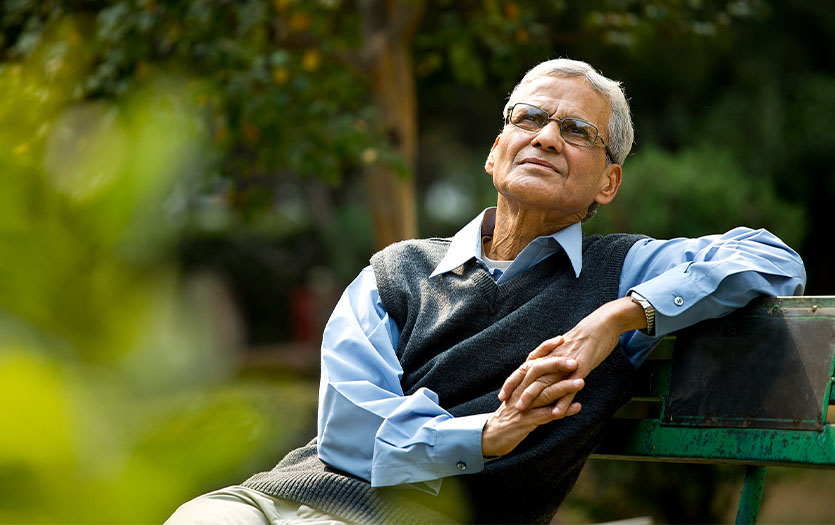Enjoy this monthly post on stress and mindfulness from Dave Johnson, PhD, CNS, BC, LMFT, employee assistance specialist.
On Labor Day weekend I decided to engage my grandchildren in the art of making homemade ice cream. I had done so with my own children periodically during their childhood and I thought it might be a treat to bring this culinary tradition forward to a new generation. I set a mindful intention to help the entire family get into the spirit and joy of this festive activity. I have 8, soon to be 9, grandkids. I knew that the children between 2 and 6 years old would gladly be my helpers and the 9 to 10 year olds, I assumed, would also think it was cool. I made up the mixture of cream, sugar and vanilla ahead of time and of course had lots of toppings for them to use once it was complete. We were all set – ready to make sweet memories. Physically helping the younger ones “crank” the handle and add the needed salt to the ice surrounding the container would spark conversation and joy … or so I thought.
OK, so I forgot how quickly youngsters run off and I soon found myself cranking the mixture alone. I tried to create a fun lyric hoping to draw in the distracted helpers. Madison, who is 11, went over to her grandmother (Mimi) and asked her if Poppy (me) didn’t realize that he could just go to the grocery store and buy ice cream. William and Austin, both 2, hung with me the longest. They picked up on my lively jingle, which went something like, “When you think it’s done ... just keep cranking … yep, just crank some more and more and more.” The tune was fast and uplifting if I do say so myself. They seemed to enjoy both my singing and adding the salt and ice to the surrounding ice cream maker. Success!
Experiencing a lapse in mindful judgment, I walked away from the cranking 2 year olds. After a bit, I turned back to see them adding dirt and mulch to the ice and salt mixture. They explained that they were creating “chocolate” with the yummy yard ingredients. I didn’t do a good job of concealing the disappointment from my face and proceeded to blurt out that silly question that all parents and grandparents ask young children: “Why did you do that?” The joy had disappeared for a moment. The 2 year olds looked confused. Ahhh, I caught myself. I quickly put the smile back on my face and began singing, “When you think it’s done … just keep cranking …” William and Austin chimed in. Good recovery, Poppy.
We all get dirt and mulch thrown into our ice cream makers sometimes. We experience setbacks in our quest to spread and obtain happiness. Here are some mindfulness and stress relief tips for your journey:
- Set Intentions. Much mindlessness and autopilot stressed reactions can be averted with pausing to think through what one hopes to achieve with relational encounters. If my intention is to build connectedness and joy, then I need to focus and stay present to my purpose. Periodically reminding myself of the intention helps to stay the course.
- Stay curious. Mindfulness is to an attempt to stay aware of the current moment using my senses (what I see, hear, touch, taste, feel). Being open to the bigger unfolding story of what actually takes place in the moment is relevant to the journey. Joy is often the anticipated and the unexpected. Unraveling, and in my case the addition of unplanned ingredients, added drama to the story. If joy and delight was the intended outcome, staying curious to what happens is just as important as, or more important than, the byproduct of ice cream.
- Regroup quickly. Notice the emotional turmoil of old story, old hurt, old pain or triggers or buttons that get pushed when I don’t feel in control. Just taking a slow deep breath or touching a Saint Francis medal that I wear under my shirt helps to ground me to what is important. I fail miserably often and have said and done things I later regret. Pausing and coming back to my senses helps me to regroup my emotional and reactive brain.
- Rethink the use of “why” questions. It is important to me to remind myself that “why” questions often create stress and confusion and defensiveness in self and others. Sometimes just asking, “What’s going on here?” is a bigger question. Changing course or redirecting is sometimes needed. This seems easy with ice cream and 2 year olds but most life lessons take a lifetime to learn. Noticing how and when I ask “why” questions that spin confusion might help me avoid additional or unintended stress.
- Enjoy the ice cream! OK, so I had to include this tip since ice cream was a great byproduct of my story. None of the dirt or mulch actually got into the ice cream, only the surrounding ice-salt bath, which was easy to rinse off. Taking time to savor family moments is what is most important and having a real bowl of ice cream and noticing the joy it brings to others is delicious. Taking time to heighten sensory awareness of smelling, touching, tasting, hearing and feeling, is the essence of mindfulness. Food (and beverage) are sure ways to quicken the spirit. Be sure to draw attention to the savory moments of life.
- Rejoice and notice. Stories have a way of continuing and unfolding. (Re-joy) Rejoice is the re-telling of the joy story. Becoming an observer of the marvelous unfolding takes practice, especially during stressful encounters. Grounding oneself in the unknowingness and letting go of what one doesn’t know is certainly easier said than done. The day after making ice cream with the kids, my daughter texted me a picture of two of the grandkids eating leftover ice cream the next morning for breakfast (packed with nutritious eggs, milk and vanilla). William was bellowing that morning, “When you think it’s done, crank some more, sissy,” to his 1-year-old sister, Eloise. I smiled on the outside and the inside. Joy is in the moment. Rejoicing – hearing the story retold – is even more glorious!
- Consider Gratitude Journaling. Writing in a gratitude journal to rejoice and reflect on what one is thankful for primes the brain pump for noticing. This builds awareness of more gratitude. In May 2016 I blogged about journaling process for coping with stress. One can journal to sort through raw and confusing emotions, but sometimes penning the quick story that brought a smile or two is a great way to build the positive emotional bank account.
- Join a mindfulness group! The practice of brain health, and coming to our physical senses, setting intention and having awareness of our emotional reactivity is a formal and informal journey. I tell participants at the Center for Health Living (CFHL) who come to practice a sitting mindful meditation that it is not enough to know that we need to eat healthy, stay fit and be mindful. Health practices require practice. Joining a group to periodically adds accountability, commitment and reinforcement. Getting in touch with deep relaxation and calmness soothes the nervous system and builds trust of one’s capacity and resilience to adapt to stress. Perhaps more important is to cultivate awareness of joy, gratitude and connectivity with others.
Try a guided meditation with Dr. Johnson.
Find a relaxing space and follow along as he leads you through a brief mindfulness practice*.
Mindfulness-based stress reduction practice has been extensively researched and proven helpful for coping with changes, grief, healthy eating patterns, pain, anxiety, depression and many other chronic disease and autoimmune disorders. For more on stress management programs and techniques, contact the Parkview Center for Healthy Living at (260) 672-6500.
Dr. Johnson also provides on-site guidance for teambuilding, emotional intelligence, transformational leadership, among other topics. To learn more about Employees Assistance Programs for your company, call Business Development at (260) 373-9013.
Other resources:
Free 1:1 Stress and Mindfulness consultations (telephonic or in person) or Free Stress Relief Mindful Meditation Practice sessions With Dr. Dave Johnson: Call the Parkview Center for Healthy Living at (260) 672-6500.
Dr. Dave’s TedX talk on Integrate Mindfulness
Facebook: Integrate Mindfulness
*Dr. Johnson cautions anyone practicing this meditation to avoid doing so while driving or doing any other activity that requires your absolute concentration.



